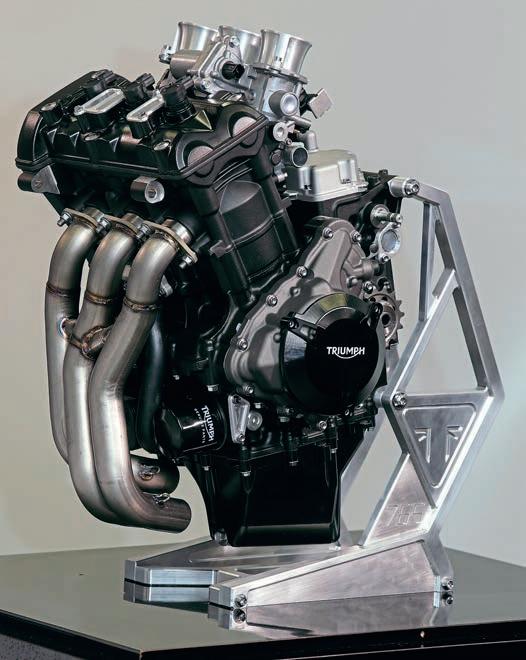
1 minute read
TRIUMPH E-FUEL RESEARCH KICKS OFF
Depressed about electric bikes becoming the only option in the future? Confused about how we’re going to get anything like respectable performance from two-wheelers lugging around massive 150kg lithium batteries? Frankly terri ed by the proposed government ban on all petrolpowered motorbikes by 2030 or 2035, as is the current plan?
Well, you’re not alone, hombre. The industry is quietly lling its pants at the thought of having to adopt a technology that works okay (sort of) in a £30k-plus, two-tonne car but is useless for £15k 200kg motorcycles that make over 150bhp and can do nearly 200 miles between three-minute ll-ups.
So, there’s a big hunt on for an alternative to battery power that still ticks the ‘no CO2’ box (or at least minimises it). One option is hydrogen, although that comes with some non-trivial problems around storage and production. But another is bio-fuels, which Triumph is launching a new research project to investigate, alongside MotoGP owner DORNA.

The Hinckley out t is aiming to see how its 765 Street Triple Moto2 engine will run on bio-ethanol, produced from fermenting and distilling plant material like maize. The aim is to have the Moto2 bikes running on E40 – petrol containing 40% ethanol – in 2024, and E100 –pure ethanol – by 2027.
The aim is twofold: allow the absolutely tiny ecological impact of MotoGP racing to be mitigated as a marketing move, while also (perhaps) paving the way towards road bikes using much more bio-ethanol in future.
Ethanol produces CO2 when burnt, but the plants used to make it had to absorb that carbon from the air in the rst place, so in theory there’s no net emissions. In practice, energy is used in its production, so it’s not a 100% carbon-free technology.
Ethanol is actually fairly decent as a fuel in some ways. It has a high-octane number so resists knocking very well and doesn’t need a lot of modi cation to basic petrol engine design to run. It’s not great for many older bikes, which weren’t really designed for it – but as a possible steppingstone away from the small-scale fossil fuel use that motorcycling represents, it’s de nitely an option.
In a Triumph press release, Steve Sargent, Triumph’s chief product of cer, said: “Ultimately, our aim is always to take all the learnings we gain from racing to make our road bikes even better, which of course encompasses not just performance but also their impact on the environment.

“I can tell you that everybody here at Triumph is very excited to be involved in such signi cant developments at such a pivotal moment in motorcycle history.”






